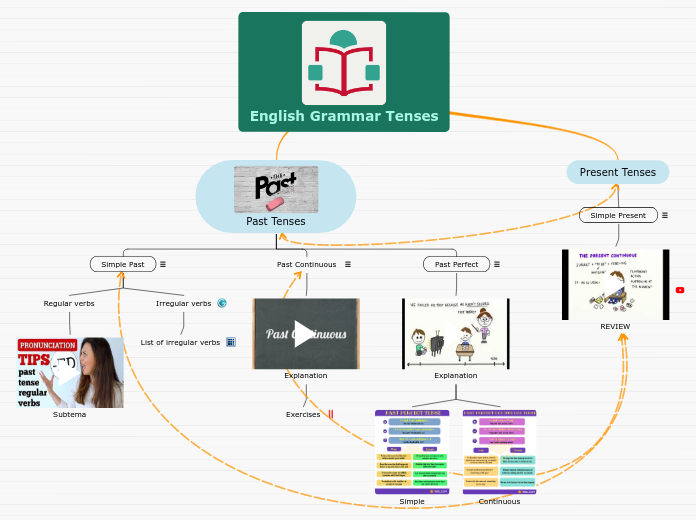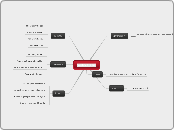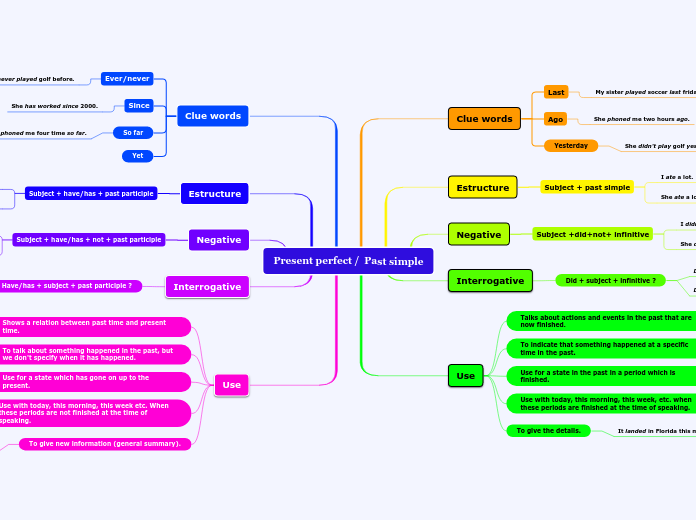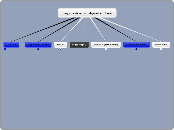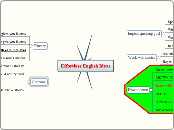English Grammar Tenses
Present Tenses
Simple Present
We use the present simple to talk about:
- something that is true in the present:
I'm nineteen years old.
I'm a student.
He lives in London.
- something that happens regularly in the present:
I play football every weekend.
- something that is always true:
The human body contains 206 bones.
Light travels at almost 300,000 kilometres per second.
We often use
adverbs of frequency
like sometimes, always and never with the present simple:
I sometimes go to the cinema.
She never plays football.
REVIEW
Past Tenses
Past Perfect
The past perfect is made from the verb had and the past participle
of a verb:
I had finished the work.
She had gone.
The past perfect continuous is made from had been and the
-ing form
of a verb:
I had been working there for a year.
They had been painting the bedroom.
The past perfect is used in the same way as the
present perfect
, but it refers to a time in the past, not the present. We use the past perfect:
- for something that started in the past and continued up to a given time in the past:
When George died, he and Anne had been married for nearly fifty years.
She didn't want to move. She had lived in Liverpool all her life.
For this use, we often use the past perfect continuous:
She didn't want to move. She had been living in Liverpool all her life.
Everything was wet. It had been raining for hours.
- for something that happened several times before a point in the pastand continued after that point:
He was a wonderful guitarist. He had been playing ever since he was a teenager.
He had written three books and he was working on another one.
- when we are reporting our experience up to a point in the past:
My eighteenth birthday was the worst day I had ever had.
I was pleased to meet George. I hadn’t met him before, even though I had met his wife several times.
- for something that happened in the past and is important at a later time in the past:
I couldn't get into the house. I had lost my keys.
Teresa wasn't at home. She had gone shopping.
We often use expressions with for and since with the past perfect:
I was sorry when the factory closed. I had worked there for ten years.
I had been watching that programme every week since it started, but I missed the last episode.
We do not normally use the past perfect continuous with
stative verbs
. We use the past perfect simple instead:
Up until that moment, I'd never believed (NOT been believing) in astrology.
Continuous
Simple
Past Continuous
We use the past continuous to talk about the
past
:
- for something which happened before and after another action:
The children were doing their homework when I got home.
Compare: The children did their homework when (= after) I got home.
This use of the past continuous is very common at the beginning of a story:
The other day I was waiting for a bus when …
Last week, as I was driving to work, …
- for something that happened before and after a specific time:
It was eight o'clock. I was writing a letter.
Compare: At eight o'clock I wrote (= started writing) some letters.
- to show that something continued for some time:
My head was aching.
Everyone was shouting.
- for something that happened again and again:
I was practising every day, three times a day.
They were meeting secretly after school.
They were always quarrelling.
- with verbs which show change or growth:
The children were growing up quickly.
Her English was improving.
My hair was going grey.
The town was changing quickly.
We do not normally use the past continuous with stative verbs. We use the past simple instead:
When I got home, I really needed (NOT was needing) a shower
Explanation
Exercises
Simple Past
We use the simple past to talk about:
- something that happened once in the past:
I met my wife in 1983.
We went to Spain for our holidays.
They got home very late last night.
- something that happened several times in the past:
When I was a boy, I walked a mile to school every day.
We swam a lot while we were on holiday.
They always enjoyed visiting their friends.
- something that was true for some time in the past:
I lived abroad for ten years.
He enjoyed being a student.
She played a lot of tennis when she was younger.
- we often use expressions with ago with the past simple:
I met my wife a long time ago.
Irregular verbs
List of irregular verbs
Regular verbs
Subtema
